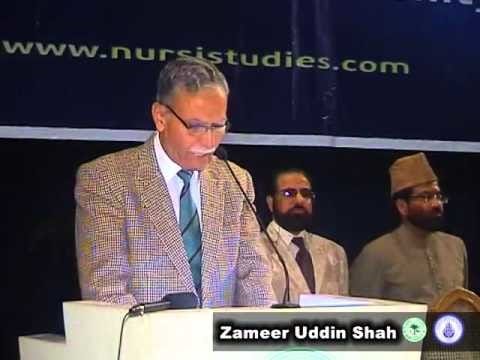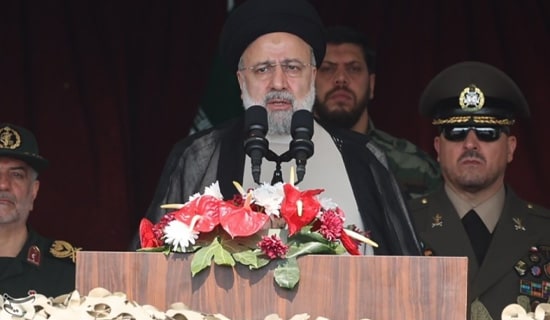
Vice Chancellor Lt.-Gen. Zameer Uddin Shah
Aligarh Muslim University (AMU), which is situated near Delhi, is a leading center of learning for Muslims in India. It was established by Sir Syed Ahmed Khan (1817-1898), popularly known as Sir Syed, was arguably the greatest Muslim reformer ever to emerge from the Indian subcontinent. Khan campaigned for modern education among the Muslims of India.
The university's current vice chancellor is Lt.-Gen. (retired) Zameer Uddin Shah, the former deputy chief of Indian Army. A recent demand by students of the AMU Women's College to be allowed entry into the university's famed Maulana Azad Library has been rejected by Shah, who is also the brother of acclaimed Indian Muslim actor Naseeruddin Shah.
Below are excerpts from a Times of India report, titled "Girls In AMU Library Will 'Attract' Boys: VC" - about the vice chancellor's decision not to open Maulana Azad Library for the students of Women's College,[1] followed by the text of an article written earlier by Tufail Ahmad, Director of MEMRI's South Asia Studies Project, who examined how the AMU is deviating from the reformist message of its founder Sir Syed Ahmed Khan.
Times Of India Report- Woman Principal Of AMU Women's College: "We Understand The [Girls'] Demand For Access To The Library; But Have You Girls Ever Seen The Library? It Is Jam-Packed With Boys"
"Turning down the demand of students of [the] Women's College, Aligarh Muslim University, for access to the varsity's Maulana Azad Library, vice-chancellor Lt.-Gen. Zameer Uddin Shah has said there would be 'four times more boys' in the library if girls were allowed in The issue is not of discipline, but of space. Our library is packed,' the VC said, justifying why the girls were not allowed membership.
"Women's College principal Naima Gulrez echoed the VC's views. Addressing the audience on Monday [November 10] during the oath-taking ceremony of the new students' union, she said, 'We understand the demand for access to the library. But have you girls ever seen the library? It is jam-packed with boys. If girls too were to be present in it, the discipline issue might crop up.'
"Students of the Women's College are not allowed membership of the Maulana Azad Library, reportedly better stocked than the Women's College library. Several previous students' unions, too, had demanded access to the famed Maulana Azad Library, located within AMU and 3 km from the Women's College.
"Gulfiza Khan, president of the Women's College Students' Union, said, 'We are students of Aligarh Muslim University. We, too, should have the benefit of accessing the famous Maulana Azad Library. The library in the Women's College is not enough. If space is a problem, we can just issue books [i.e. we can have books issued to take home] and not sit in the library.' She asserted that access to a good library was necessary for the all-round development of students, without discrimination between boys and girls.
"Khan also mentioned other demands, including a visitor's room, proper classrooms, clean drinking water, availability of ambulance and doctor on campus, coaching for the civil services, and hygiene. Vice-president of the union Noorain Batool and secretary Afra Khanam also emphasized the need for access to the Maulana Azad Library."
Former Women's College Student: "The First Time I Stepped Into The Maulana Azad Library, I Was Awed By Its Grandeur I Felt Frustration At Not Being Able To Reach Out To Those Shelves, Browse Through Books"

Maulana Azad Library at AMU
SUPPORT OUR WORK

"The Women's College was established in 1906 and the Maulana Azad Library was set up decades later. Students of the Women's College were never given membership of the library, which can seat 1,300 readers at a time. The library also has 12 seats reserved for women students of AMU.
"Librarian Amjad Ali of the Maulana Azad Library said, 'If the Women's College library demands books, we send them instantly. The purpose is solved without the students coming here.'
"Shadab Bano, assistant professor of History at the Women's College, said, 'The discipline issue can be tackled only if women are not in a minority in the library, which is usually packed with male students. And also, it is the responsibility of the university to assure the safety and protection of women.'
"In a blog on a TV news channel, an alumna of the Women's College had written in 2011: 'The first time I stepped into the Maulana Azad Library, I was awed by its grandeur. More than that, I felt frustration at not being able to reach out to those shelves, browse through books, and borrow a tiny bit of that wealth. It is time that the university stops infantilizing and discriminating against its female students, and starts treating them with equal dignity and respect.'
"Another Women's College alumna, Aliya Khan, now pursuing post-graduation in AMU, expressed surprise at being told what had happened during the day. 'The problem is still the same. In my time in 2010, the teachers told us that we will issue books for you in our name, so you will not have to go there.'"
The Times of India daily also offered its own "Times View", stating:
"It is really quite retrograde that girls should be disallowed from using the general library at a university on the grounds that their presence will lead to undue attention from male students. This logic is of a piece with the argument that women should not wear 'provocative' clothes if they do not want to be molested or raped. If the fear is that male students will behave in an unseemly fashion, why should girls be denied access to the best library? We hope that better sense will prevail and the vice-chancellor will realise that such a ban is not keeping with modern values."
Article By Tufail Ahmad In New Indian Express: "[AMU's] Negligible Role In Scientific Innovation, Original Research In Social Sciences  Reflects The Following: A Comprehensive Failure To  Promote Meritorious Teachers, Lack Of Progressive Culture, And Free Thinking Among Students"

AMU founder Sir Syed Ahmed Khan (1817-1898)
"Every year, October 17 is celebrated on the campus of Aligarh Muslim University to mark the birthday of Sir Syed Ahmad Khan (1817-1898), arguably the 19th century's foremost Muslim reformer. After the fall of the Mughal rule in 1857, Sir Syed thought deeply over the causes of Muslim decline and argued for rejecting religious orthodoxy and initiating educational reform to ensure advancement of Muslims. He toured England during 1869-70, learned about the British educational system, familiarized himself with the ideas of European enlightenment and sciences, and returned, inspired by The Spectator of London, to launch Tahzibul Akhlaq, a journal for educational and social reform among Muslims.
"AMU alumni groups organize Sir Syed Day functions on October 17 in India, the Middle East and North America, but his message of enlightenment and reform is lost. Invariably, the annual functions are known for two features: dinners and mushairas, or Urdu poetry recitations. While Urdu did play a role as the language of rebellion against the British, its contribution to generating good ideas for the advancement of Muslims now is nil. Under incapable editors, Tahzibul Akhlaq, which once stood for advancing scientific temperament among Muslims, is reduced to promoting friends and reproducing translations of articles. It has failed to challenge religious orthodoxies, cause a stirring of ideas among students and the wider Muslim society, debate arguments on issues that matter to Muslims. It is hardly read on campus.
"There is no dearth of ideas among Muslims, but good ideas are missing. Across the Islamic world, clerics and academics are establishing disciplines like Islamic sociology and Islamic finance in a bid to revive Islam. They are full of ideas, reproducing the same ideas each time. AMU has a large residential campus that can match any varsity. It runs hundreds of courses from food craft, theology, and management to foreign languages, tourism, and physical and social sciences. It trains students in various skills and can take credit for bringing Muslim youth from rural areas and turning them into a graduate on a par with the national average, but a university of its scale and infrastructure is performing far below its potential.
"Its negligible role in scientific innovation, original research in social sciences, or excellence in other fields reflects the following: a comprehensive failure to recruit and promote meritorious teachers, lack of progressive culture and free thinking among students, inability to promote a culture of debate and questioning on campus, and the like. In that sense, AMU mirrors the wider Muslim society. Also, hooliganism among students is corroding academic culture; students' table manners will make any visitor ashamed; AMU student union leaders have engaged in collecting bhatta (extortion) from nearby shops and were recently the subject of ridicule for spending, in one case, one lakh rupees on buying water for a function."
"[AMU Must] Foster A Culture Of Debate That Challenges Religious Orthodoxies Among Muslims, Thereby Creating A Wider Intellectual Base From Which Reformist Muslim Writers In India Can Advance Sir Syed's Message Of Enlightenment"
"In India and abroad, it is understood that universities should be administered by academics who better understand their needs. However, it seems that Muslim societies have a predilection for Islamism and authoritarianism, factors evident in the governance of leading minority institutions like the AMU and the Jamia Millia Islamia of Delhi. Regionalism, feudalism and Islamism are undermining north Indian Muslim educational institutions, combined with a failure in the voluntary education sector. P K Abdul Aziz, a southerner from Kerala [state of India] who did not speak Urdu and did not bend to the pulls of the feudal, Islamist and regional lobbies of north Indians on the AMU campus, was accused of being an enemy of Urdu and forced to quit as VC.
"On October 17 [2013], at the main function to mark Sir Syed's 196th birthday, AMU vice chancellor retired Lt.-Gen. Zameer Uddin Shah pledged to turn the university into an 'intellectual powerhouse' but Shah has recently shunned the path of setting up expert committees to recruit academics. Instead, he has misused emergency powers to appoint professors, notably in the departments of West Asian studies, English and electronics engineering - one of them being a retired major general with no teaching experience in West Asian [Middle Eastern] studies, another an Islamist ideologue with no research experience in English, and a third from the [revivalist Islamic group] Tablighi Jamaat with no degree in electronics. Shah, a former deputy chief of Indian Army, has relied on recruiting retired military officials to key offices, notably Brig. S. Ahmad Ali as pro-VC, Gr. Captain Shahrukh Shamshad as registrar, and another as an intermediate college principal.
"Despite the total absence of government interference in recruitment of its vice chancellor, AMU has been run by retired officers from the military and the Indian administrative service in recent decades. Dr. Shamim Akhtar, an assistant professor at AMU's department of adult and continuing education, says Shah's reliance on former military officers strengthens a culture of nepotism on campus and damages academic excellence and motivation of the teaching staff whose anger recently stopped him from appointing a military man as caretaker of the medical college. Akhtar rues that elections to the teachers' association are marked by public demonstrations of regional loyalties, and regionalism - between those from eastern and western UP [Uttar Pradesh state] - prevents recruitment of meritorious teachers.
"Insofar as the culture of feudalism, regionalism, and Islamism has seeped into the functioning of AMU, it is unlikely that it can shake off these corroding agents, but there is a way forward. On the AMU website, a passage about its founder notes that the Aligarh Institute Gazette, a journal started by Sir Syed, 'succeeded in agitating the minds in the traditional Muslim society. Anyone with a poor level of commitment would have backed off in the face of strong opposition but Sir Syed responded by bringing out another journal, Tahzibul Akhlaq.' The challenge now before AMU and the editors of Tahzibul Akhlaq is to foster a culture of debate that challenges religious orthodoxies among Muslims, thereby creating a wider intellectual base from which reformist Muslim writers in India can advance Sir Syed's message of enlightenment and reform."[2]
Endnotes:




